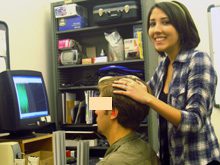Alexandra Carstensen L&S Sciences
Time in the Brain: An Investigation of Spatial Representations of Time using Transcranial Magnetic Stimulation
How does the brain represent concepts outside of perceptual experience? Relatively little is known about the neural mechanisms and brain areas involved in abstract thoughtthose enabling us to conceptualize domains for which we lack dedicated perceptual systems. Theories of embodied cognition suggest that understandings of such abstract domains are constructed from co-experienced perceptual input; for instance, Lakoff & Johnson (1999) have proposed that we build representations of time based on experiences of movement through space, as we consistently experience the passage of time while moving. This research seeks to determine if our sense of time arises in part from experiences of motion. Specifically, it asks whether judgments of temporal duration are altered by rTMS disruption of motion-selective visual areas in the medial temporal and medial superior temporal cortex.
Message To Sponsor
The theory Im investigating, conceptual metaphor, has been my passion since high school. While my love of learning drove me to Berkeley and my enthusiasm for thinking about thinking has made the psychology major second nature for me, its SURF that has enabled me to finally make the greatest strides toward my ideal career in research and an enhanced knowledge of knowledge itself.